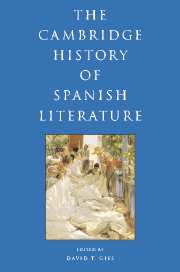Book contents
- Frontmatter
- I INTRODUCTION
- II HISTORY AND CANONICITY
- III THE MEDIEVAL PERIOD
- IV EARLY MODERN SPAIN: RENAISSANCE AND BAROQUE
- V THE ENLIGHTENMENT AND NEOCLASSICISM
- VI THE FORGING OF A NATION: THE NINETEENTH CENTURY
- 22 Romanticism in Spain
- 23 The theatre in Romantic Spain
- 24 Mariano José de Larra
- 25 Romantic poetry
- 26 Romantic prose, journalism, and costumbrismo
- 27 Benito Pérez Galdós
- 28 The Realist novel
- 29 The Naturalist novel
- 30 The theatre in Spain 1850–1900
- 31 Poetry in the second half of the nineteenth century
- VII THE MODERN, MODERNISMO, AND THE TURN OF THE CENTURY
- VIII TWENTIETH-CENTURY SPAIN AND THE CIVIL WAR
- IX IN AND OUT OF FRANCO SPAIN
- X POST-FRANCO SPANISH LITERATURE AND FILM
- Bibliography
- Index
- References
29 - The Naturalist novel
from VI - THE FORGING OF A NATION: THE NINETEENTH CENTURY
Published online by Cambridge University Press: 28 March 2008
- Frontmatter
- I INTRODUCTION
- II HISTORY AND CANONICITY
- III THE MEDIEVAL PERIOD
- IV EARLY MODERN SPAIN: RENAISSANCE AND BAROQUE
- V THE ENLIGHTENMENT AND NEOCLASSICISM
- VI THE FORGING OF A NATION: THE NINETEENTH CENTURY
- 22 Romanticism in Spain
- 23 The theatre in Romantic Spain
- 24 Mariano José de Larra
- 25 Romantic poetry
- 26 Romantic prose, journalism, and costumbrismo
- 27 Benito Pérez Galdós
- 28 The Realist novel
- 29 The Naturalist novel
- 30 The theatre in Spain 1850–1900
- 31 Poetry in the second half of the nineteenth century
- VII THE MODERN, MODERNISMO, AND THE TURN OF THE CENTURY
- VIII TWENTIETH-CENTURY SPAIN AND THE CIVIL WAR
- IX IN AND OUT OF FRANCO SPAIN
- X POST-FRANCO SPANISH LITERATURE AND FILM
- Bibliography
- Index
- References
Summary
It is customary to associate Naturalism most frequently with Thomas Hardy (1840–1928) and the experimental novel of Emile Zola (1840–1902). From the beginning of their stories, it is patent that the protagonists are placed in circumstances that will inexorably crush them into hopelessness and death. These circumstances, which affect disproportionately the low-born protagonists usually favored by Naturalism, are those of heredity, birth, gender, and socio-economic class. In Spain this kind of novel, that of “radical Naturalism” or “barricade Naturalism,” was cultivated intensely by few writers, with Eduardo López Bago (1853–1931) and Alejandro Sawa Martínez (1862–1909) being most prominent. In the former’s tetralogy composed of La prostituta (“The Prostitute,” 1884), La pálida (“The Pallid Woman,” 1884), La buscona (“The Picara,” 1885), and La querida (“The Mistress,” 1885), and the latter’s El cura (“The Priest,” 1885) and La mujer de todo el mundo (“The Woman of All Men,” 1885), the little-remembered, never-popular López Bago and Sawa practice the Zola–Hardy deterministic Naturalism explicitly rejected by most Spanish novelists of the period.
This is not to say that these novelists denied the importance and influence of biology, environment, economics, and gender on real people and hence on their fictive counterparts. In La desheredada (“The Disinherited Lady,” 1881), Benito Pérez Galdós (1843–1920) explored the effect of heredity and socio-economic class on Isidora Rufete and her brother Pecado. In Los pazos de Ulloa (“The Ulloa Manor House,” 1886) and in La madre naturaleza (“Mother Nature,” 1887), Emilia Pardo Bazán (1851–1921) observed how the often barbarous conditions of rural life shape persons of all classes; and, in Los pazos de Ulloa, Morriña (“Homesickness,” 1889), and Insolación (“Midsummer Madness,” 1889), she treated the gender and economic limitations under which women live.
- Type
- Chapter
- Information
- The Cambridge History of Spanish Literature , pp. 423 - 435Publisher: Cambridge University PressPrint publication year: 2005



